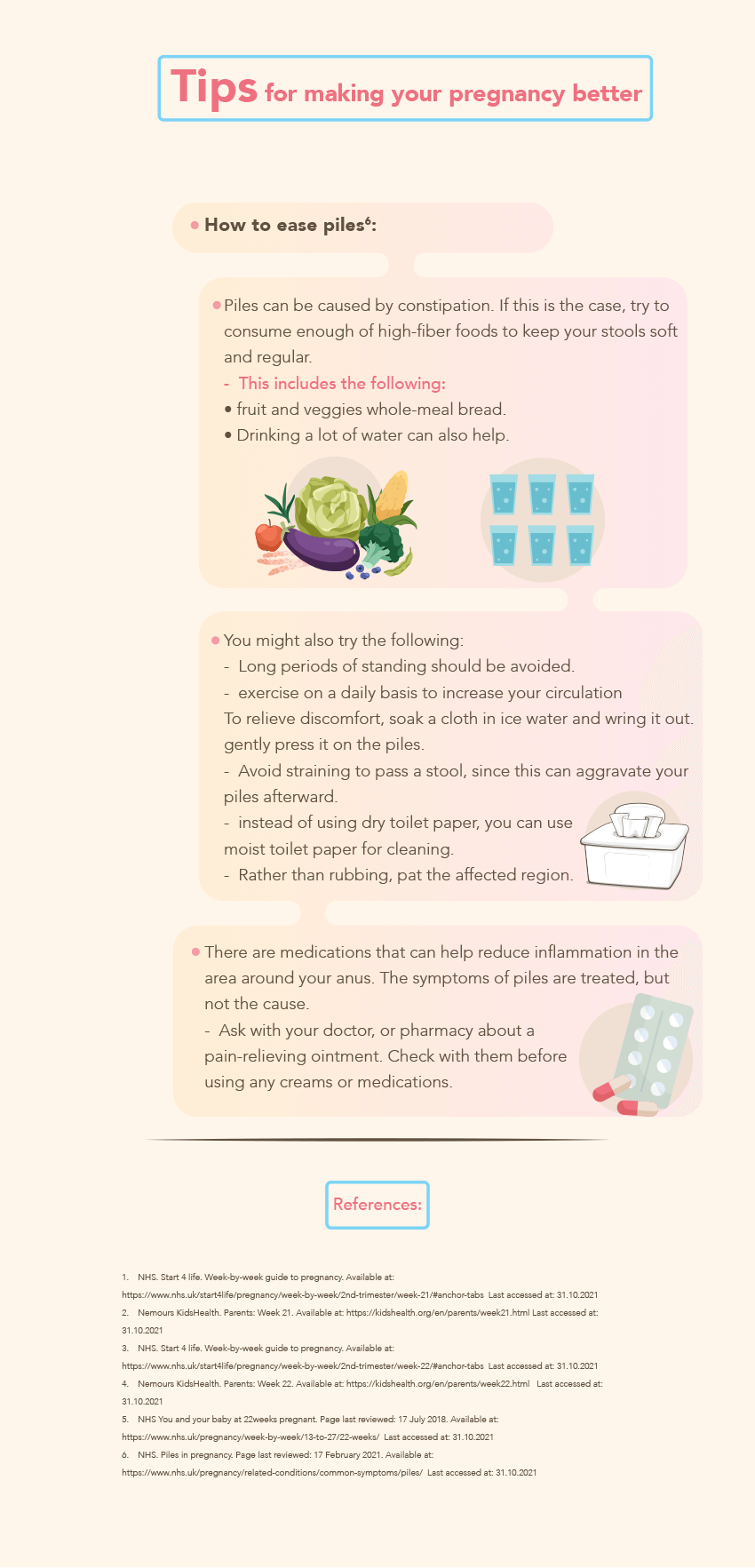Pregnancy Week 21 & 22
You'll be entering a phase of rapid growth as you enter the second half of your pregnancy. Your baby is preparing for life outside the womb by developing important skills such as sucking and breathing.


Your Pregnancy Week 21
What is happening with your baby at pregnancy week 21?1,2
- Your baby has outweighed the placenta. By giving food and eliminating waste, the placenta essentially serves as a larder and toilet. It will continue to grow during your pregnancy in order to carry out its essential function.
- Meanwhile, your kid has developed a fine, downy coating of hair called lanugo; the purpose of this fur coat is likely to keep your baby at the ideal temperature, and it normally disappears before birth.
- Hair and brows are also sprouting on your kid. Some babies are born with very little hair, while others have a lot. It doesn't make much of a difference because, when their hormone levels fluctuate, they'll probably lose all the hair they were born with within the first year of their existence.
- Your baby can now hear sounds and voices outside of the safety of their womb. If you sing to your baby, they will be your biggest fan, no matter how bad it sounds.
How big is your baby?
Your baby is approximately the size of a carrot, and the weight of five whole meal pitta breads.1
Your Body1
- It's not surprising that you're more clumsy than usual because your center of gravity has changed and your joints are looser. Don't panic if you fall over; there's plenty of cushioning in your belly to keep your baby safe. That is the purpose of the amniotic sac.
- Your baby is establishing waking and sleeping patterns and moving about a lot.
- The problem is that your baby can be ready to go right when you're ready to sleep.
- To make up for lost sleep at night, take power naps when you can.
- A healthy diet rich in fresh fruits and vegetables will offer you more energy and help you and your baby thrive.
- According to research, if you eat healthily, your baby will as well, and you'll both be less likely to develop diseases like diabetes.
- When given the option, choose wholegrain, low-fat, and low-sugar foods.
- Eat 5 servings of fruit and vegetables each day.
Your Pregnancy Week 22
What is happening with your baby when you are 20 weeks pregnant?3,4
- Your baby's lungs are developing, and he or she will be practicing breathing in your womb.
- Small amounts of amniotic fluid are now being swallowed by your baby. This will normally stay in the bowels and subsequently come out as a dark, sticky poo after birth.
- Your baby's taste buds are developing, and what you eat may affect them. Eat a healthy diet with plenty of fresh fruits and vegetables
How big is your baby?
- Your baby is approximately the size of a papaya and the weight of five tangerines.3
Your Body
- Stretch marks do not affect everyone, but if you do, they will most likely appear around 22 to 24 weeks of pregnancy.5
- They could show up on your stomach, breasts, or thighs. They appear red at first, then fade to a silvery grey.5
- There isn't much you can do to avoid or eliminate them, but you can try gently rubbing your bump with a non-scented moisturiser.3
- The marks will most likely fade to silver after the birth. They'll be your pregnant badge of honor if you can see them at all.3
- It's natural for your breasts to start leaking some pre-milk.5
- Piles are a pain in the bottom, also known as hemorrhoids. When you poo, you could feel irritated and in pain. You may also notice blood or mucous stains.3
Tips for Tips for making your pregnancy better
How to ease piles6
- Piles can be caused by constipation. If this is the case, try to consume enough of high-fiber foods to keep your stools soft and regular.
- This includes the following:
- fruit and veggies whole-meal bread
- Drinking a lot of water can also help.
- You might also try the following:
- Long periods of standing should be avoided.
- exercise on a daily basis to increase your circulation
- To relieve discomfort, soak a cloth in ice water and wring it out. gently press it on the piles
- Avoid straining to pass a stool, since this can aggravate your piles afterward.
- Instead of using dry toilet paper, use moist toilet paper for cleaning.
- Rather than rubbing, pat the affected region.
- There are medications that can help reduce inflammation in the area around your anus. The symptoms of piles are treated, but not the cause.
- Ask with your doctor, or pharmacy about a pain-relieving ointment. Check with them before using any creams or medications.
- Ask with your doctor, or pharmacy about a pain-relieving ointment. Check with them before using any creams or medications.
References:
- NHS. Start 4 life. Week-by-week guide to pregnancy. Available at: https://www.nhs.uk/start4life/pregnancy/week-by-week/2nd-trimester/week-21/#anchor-tabs Last accessed at: 31.10.2021
- Nemours KidsHealth. Parents: Week 21. Available at: https://kidshealth.org/en/parents/week21.html Last accessed at: 31.10.2021
- NHS. Start 4 life. Week-by-week guide to pregnancy. Available at: https://www.nhs.uk/start4life/pregnancy/week-by-week/2nd-trimester/week-22/#anchor-tabs Last accessed at: 31.10.2021
- Nemours KidsHealth. Parents: Week 22. Available at: https://kidshealth.org/en/parents/week22.html Last accessed at: 31.10.2021
- NHS You and your baby at 22weeks pregnant. Page last reviewed: 17 July 2018. Available at: https://www.nhs.uk/pregnancy/week-by-week/13-to-27/22-weeks/ Last accessed at: 31.10.2021
- NHS. Piles in pregnancy. Page last reviewed: 17 February 2021. Available at: https://www.nhs.uk/pregnancy/related-conditions/common-symptoms/piles/ Last accessed at: 31.10.2021